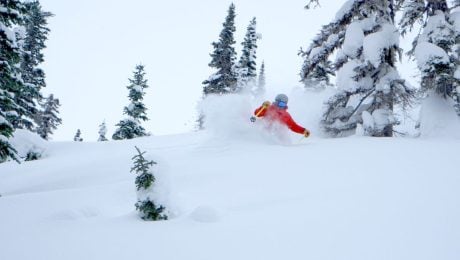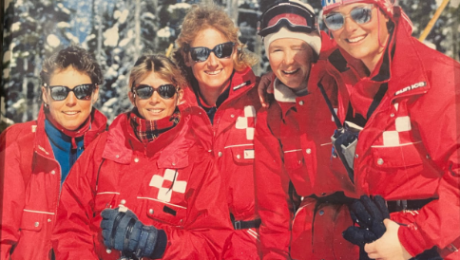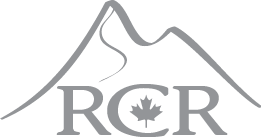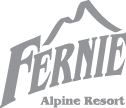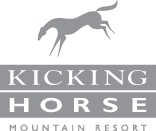That Thing About Fernie
What makes Fernie amazing is different than what most cities care to boast about.
I moved here (basically) sight unseen. Having visited here once before (and when I had pneumonia), I didn’t have much to go off of. Yet, I was drawn to Fernie in a way that is difficult to describe. I’ve lived all over the world, but something about Fernie feels just right.
I love how the town’s energy and community follow the seasons. The anticipation of winter and spring skiing, the dog days of summer, and the cooling and calming sense of Fall. There’s always an adventure to be had—or not. Unlike other mountain towns, I enjoy that Fernie doesn’t have a pretentious vibe that’s out to shame anyone who’s not pursuing a FKT (fastest-known time). If you want to get after it, there are folks for that. If you don’t, there are folks for that, too! Fernie even has its own “Leisure Athletes” club. Pretty darn special, if you ask me.
The first time my parents visited, my Dad took a photo of the Lizard Range and shared it on social media. Instantly, his friends worldwide commented, “Wow!” and “Your daughter is so lucky to live there!”
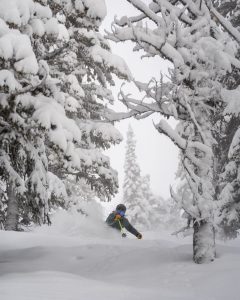
Claire enjoying the Fernie powder!
They’re not wrong. We are all lucky to live here. But is it luck? What makes Fernie special is that it’s an intentional place you want to spend your time. What Fernie lacks in major shopping or stuffy social events makes this place incredible. You don’t come here for the Aspen glamour or the Whistler glitz. Traveling here isn’t exceptionally easy, and it’s not frustratingly difficult. It’s just right, nestled in the mountains and hidden from all too many.
As the famous Jerry Garcia once said, “We would all like to be able to live an uncluttered life, a simple life, a good life.”
Not only because I’m a huge Dead Head, but I think Jerry was onto something. When I have visitors, the realization that Fernie’s life is what Jerry was thinking of hits my brain like the glint of brilliant snow crystals on a splitting blue powder day. When you go on vacation, the complicated plans most destinations require melt away here. It’s as simple as getting up in the morning, grabbing a bagel from Big Bang, and heading to the ski hill. You’re in line for the chairlift, and it’s smiles. It’s friendly. It’s passionate skiers and snowboarders lined up to have a good ol’ time. There’s a ‘frothing’ that emanates excitement, but it’s an encouraging and happy energy.
I like that living in this town means it’s small enough that you recognize people but big enough that you don’t know everyone. The most contentious argument you might engage with is “Old Side” or “New Side” (the two sides to Fernie Alpine Resort), but regardless of which you prefer, the skiing will be fabulous, and the views are endless.
One of my favorite memories from skiing Fernie is following a couple of long-time locals down through Red Tree and into some snakey tree run when my friend yelled back, “It’s like Star Wars! You have to make the ‘pew-pew’ noises as you ski through!” Skiing is about having fun, and I loved that that moment was pure, unadulterated fun.
On the adulterated fun side of things, this town loves to have a great time. For me, Griz Bar is one of those special places where walking in feels like a warm hug. You love to have that feeling of being enveloped in deep winter, and Griz Bar, in peak winter, is one of the best places on earth. Worries melt away, and there are loud cheers, hockey on the TV, and new friends being made between tables exchanging shot-skis. Staring up at the wall of fame photos, you are transported to an effortless time of good vibes and a pure love of sliding on snow. I probably shouldn’t write this, but honestly, it’s one of the best bars in the world.
The character of this town is dynamic and should be celebrated. Whatever you seek, you shall find in Fernie.
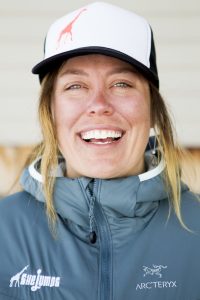
Claire Smallwood
Fernie Ski Patrol’s Mentorship Legacy and Future
How does mentorship play a role in professional development on the mountain?
Fernie Alpine Resort is home to some of the best skiing and snowboarding in Western Canada. With the elite terrain and large snowfall comes huge responsibilities for ski patrollers. Besides getting to ski powder while the rest of us wait with nervous anticipation for the lifts to open or the rope to drop—they are carrying the mental (and physical!) weight of keeping the mountain safe for everyone and often dealing with multiple incidents on top of heavy snowfall and tricky avalanche conditions. It requires an incredible amount of teamwork, compassion, strength, and mental fortitude.
But how do you succeed as a professional ski patroller, and what challenges are there for women in these roles? Data shows that only 23% of pro patrollers are women today.
I sat down with a few Fernie Alpine Resort legends to learn more about how mentorship has factored into the success of past, present, and future female professional ski patrollers.
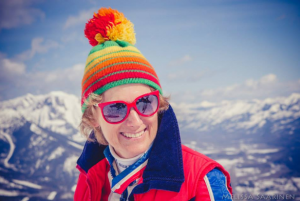 Sue Boyd is a local Fernie legend. She started her career as a professional ski patroller in Blackcomb back in 1985, where she was one of six women on the roster. When Sue was hired at Fernie Snow Valley in 1990, she was the only female professional ski patroller until 1996. (Sue notes that she was not the first female professional ski patroller—there was another woman there in the early 80s). One of the claims to fame that Sue does have: she was the first female Ski Patrol Leader at Fernie Alpine Resort from 2002 to 2005.
Sue Boyd is a local Fernie legend. She started her career as a professional ski patroller in Blackcomb back in 1985, where she was one of six women on the roster. When Sue was hired at Fernie Snow Valley in 1990, she was the only female professional ski patroller until 1996. (Sue notes that she was not the first female professional ski patroller—there was another woman there in the early 80s). One of the claims to fame that Sue does have: she was the first female Ski Patrol Leader at Fernie Alpine Resort from 2002 to 2005.
Sue has a long list of achievements that go well beyond her role as a Patrol Leader in Fernie. She was a Canadian Freestyle Ski Team member and competed in moguls, aerials, and ski ballet at the World Cup Level. As a CARDA dog handler, she has trained and certified three avalanche rescue dogs throughout her career. She’s taught Non-stop ski patrol training courses and AST courses. She worked at Island Lake Lodge for eight years as a tail guide and snow safety and explosives trainer. And if that isn’t cool enough, she also has led backcountry horse trips in the mountains around Canada.
Sue credits her success in her career on snow to being a good listener, someone who pays close attention and asks meaningful questions. She also says having something in common with the person you are learning from helps.
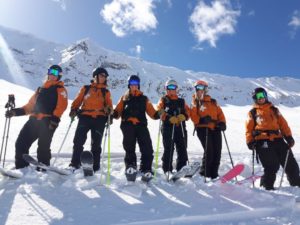 When I asked Sue if she’s ever had the chance to mentor someone else, she highlighted that her success and experiences in the mountains mirror many life lessons we tend to learn over time. Meaning? It’s all about just getting along with folks. “I didn’t think of it as ‘I’m the mentor, you’re the mentee,’ it just happened. If someone wanted to learn from me, and I felt accepted as being able to teach them, and we got on well, I would share my knowledge and experience. Personalities are a big part of it. Sometimes it works, sometimes it doesn’t. There has to be mutual respect at both ends.”
When I asked Sue if she’s ever had the chance to mentor someone else, she highlighted that her success and experiences in the mountains mirror many life lessons we tend to learn over time. Meaning? It’s all about just getting along with folks. “I didn’t think of it as ‘I’m the mentor, you’re the mentee,’ it just happened. If someone wanted to learn from me, and I felt accepted as being able to teach them, and we got on well, I would share my knowledge and experience. Personalities are a big part of it. Sometimes it works, sometimes it doesn’t. There has to be mutual respect at both ends.”
I asked Fernie Alpine Resort’s current ski patrol director, Tyler Steen, about Sue: “Sue was definitely a mentor to me. [She] has a level of professionalism that no one can mimic.” I asked for specifics with regard to how he defines professionalism in the ski patrol sense, and Tyler said, “Sue treated everyone the same way: She always looked at the uniform and not the person in the uniform. Even when she wasn’t actively mentoring, it would be visual. Sue always acted with the skill, talent and confidence everyone admired. I took every opportunity to observe and learn as she performed the job efficiently and effectively. She was a true professional ski patroller that we were lucky to have.”
This underscores the fact that there needs to be mutual respect for a mentor-mentee relationship to blossom. Tyler added, “this idea of a formal mentorship program for ski patrollers isn’t as straightforward as you would think. You can’t pair a Level 4 patroller with a Level 1 [patroller] just because it makes sense on paper. The person who’s learning needs to be willing to accept the knowledge being shared.”
Zooming forward from Sue’s reign on FAR patrol, I also had the chance to catch up with Olivia Johnson, a Senior First Aid Officer on professional ski patrol with Fernie.
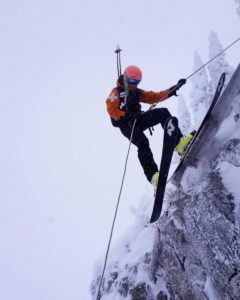 Olivia, affectionately known as “OJ”, has been on Fernie’s professional patrol squad for six seasons. “When I first started on patrol, there was still a ‘macho culture’ among the women on patrol. I wanted to do everything I could to break down that thinking. I always felt like I had to prove that I was better than the other women I worked with, or that I was a better skier, or better at this, or better at that. Thankfully there has been a big culture shift in the last six years. I work with some fantastic women who don’t need to compete with other women because of their gender. I also work with some fantastic men that fully understand that women are just as capable (if not more capable) than them and let us feel heard. The barriers are breaking down, and it feels great.”
Olivia, affectionately known as “OJ”, has been on Fernie’s professional patrol squad for six seasons. “When I first started on patrol, there was still a ‘macho culture’ among the women on patrol. I wanted to do everything I could to break down that thinking. I always felt like I had to prove that I was better than the other women I worked with, or that I was a better skier, or better at this, or better at that. Thankfully there has been a big culture shift in the last six years. I work with some fantastic women who don’t need to compete with other women because of their gender. I also work with some fantastic men that fully understand that women are just as capable (if not more capable) than them and let us feel heard. The barriers are breaking down, and it feels great.”
Tyler says this inclusive attitude is something he and the Assistant Patrol Director, Megan Kelly, actively cultivate. “We have created a mentorship culture that encourages people to actively seek out that mentorship from whoever and wherever they can get that from. If we’re doing it right, anyone can participate. Our main job is to give the individual the opportunity to succeed, and it’s up to them to take advantage of it.”
Sue might have been the first female lead patroller at Fernie Alpine Resort, but it’s clear that the team invests in gender diversity through its “hands-off’ mentorship approach that encourages the ‘whole’ person to show up for the job and be willing to work hard on a team with a positive attitude and curiosity for learning. It’s exciting for Fernie to have more women in leadership positions and cultivate an atmosphere that elevates that as a norm and not an exception.
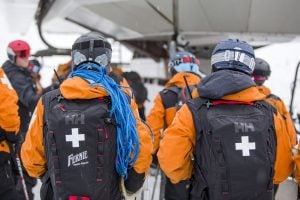 This weekend Fernie Ski Patrol will be hosting a recruitment day for interested future patrollers to learn more about what the job entails and what it’s like to work on mountain safety, first aid, and avalanche safety as a professional ski patroller. Tyler Steen says there are already nine women signed up, and of the 44 current professional ski patrollers at Fernie Alpine Resort, 14 identify as female.
This weekend Fernie Ski Patrol will be hosting a recruitment day for interested future patrollers to learn more about what the job entails and what it’s like to work on mountain safety, first aid, and avalanche safety as a professional ski patroller. Tyler Steen says there are already nine women signed up, and of the 44 current professional ski patrollers at Fernie Alpine Resort, 14 identify as female.
With this in mind, being a good, professional ski patroller is not about being the raddest skier on the mountain. Some of the challenges we face today with regard to inclusion in this career can be solved by limiting our biases and being open and willing to learn, ask questions, and treat each other with respect and as equals.





